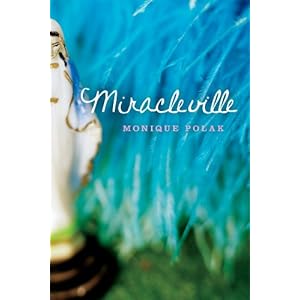Posted by Cobalt | Posted in YA | Posted on 7:50 AM

Rating: 2.5 / 5 stars
Ani is sick of being the good daughter, the polar opposite of her shameless, sex-crazed, hyperactive sister Colette. Ani may be named after a saint, and she may live in the town of miracles, but that doesn't mean she doesn't want to slap her sister silly.
Still, Ani's biggest problems are manageable, such as keeping Colette from scaring away the tourists - Saintly Souvenirs is their main income, and helping their mother run the shop can be a full-time job. There's also the issue of keeping Colette from pouncing on every cute boy in sight. And the way Colette talks about sex all the time; frankly, it makes Ani squeamish. Everyone knows good Catholics are supposed to wait until marriage.
These become minor blips when a real disaster strikes the family, turning everything on its head and leaving Ani completely bewildered. What is she supposed to think when even living in the town of miracles doesn't protect you from tragedy?
There's the basic summary, and the book frankly isn't much more than that. I'm sorry to report that this one just didn't hold my interest, and not just because of the strong religious bent. Polak does acknowledge facets to faith, overtly dismantling some of the more pervasive stereotypes, but at the same time she reinforces them through Ani's shock. If people in her community were really so welcoming all along (sex is okay with protection! gays are people too!), then why is Ani so surprised when they say so? Polak wants to have it both ways: attacking prejudice without fully acknowledging it, building a false conflict that can easily be smoothed out by the end.
Perhaps I'm being a bit harsh - after all, prejudice is a major hinge upon which the backstory rests - and Polak does take care to show the consequences of bigotry for individual lives. It may just be the audience level that's making this story feel too softball to me.
Mostly, the problem was a Telling Not Showing approach that turned the characters wooden and the situations dull. Ani comes across as a walking stereotype of virginal Catholicism, disgusted and embarrassed by her own bodily desires. And while she supposedly 'grows' throughout the book, I was so uninterested in her from the start that it didn't really register. Tellingly, Ani's most 'realistic' moment happens during a dream where she does all of the 'bad girl' things she's not supposed to -- and revels in every minute of it. If we had more of that Ani fighting to the surface at the beginning, then there might be some interest. Regrettably, this DreamAni doesn't show until 3/4 of the way through the book - and then DullAni wakes up.
Not much else to say about this one - it's not offensive or bad, it just didn't resonate with me. I'm willing to acknowledge that this one simply wasn't my Cup of Tea.

Comments (0)
Post a Comment